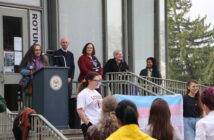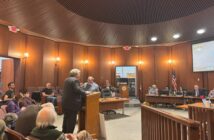As a young journalist, I have always believed the press is meant to be fearless — asking the tough questions and holding those in power accountable. The idea that no one is above scrutiny is what drew me to study this field in the first place.
But recently, I’ve found myself wondering, what happens when those in power start deciding who gets to question authority? What does this mean for the future of journalism and for all of us who depend on it?
In a shocking move made on Feb. 25, the White House said it would seize control of the press pool covering President Donald Trump. But this isn’t the first time an administration has restricted which news organizations and reporters can question the president in spaces like the Oval Office and Air Force One.
Previous presidents have also tried to control press access — delaying interviews at the last minute and strategically avoiding answering questions — but the Trump administration’s decision to selectively allow certain reporters to ask questions is particularly alarming.
This is more than just a political maneuver; it’s a direct challenge to the rights of the press in our republic.
The role of the press, acting as a check on power to ensure transparency and accountability, serves as a cornerstone of democracy. While every administration has experienced friction with the media at some point, handpicking journalists represents a shift away from protecting the freedom of the press as enshrined in the First Amendment.
Historically, the White House press rotation has included journalists from various organizations, selected by the White House Correspondents’ Association — an independent group of journalists established in 1914 that works to ensure a free press and robust coverage of the presidency.
In response to the Trump administration’s decision, Eugene Daniels, president of the association, issued a statement warning that the move strikes at the core of an independent press in a free country — where government officials shouldn’t be allowed to choose their own “press corps.”
While administrations have always exercised some control over press access, most have refrained from overtly limiting which journalists can directly question the president. However, when authoritative figures restrict questioning to favored reporters, they’re insulating themselves from scrutiny.
This limitation doesn’t just affect journalists, though. It also impacts the public’s right to news, altering the balance by allowing those in power to direct and control the flow of information.
This approach creates a media environment where only favorable narratives emerge, marginalizing voices. If certain journalists are repeatedly excluded from press interactions, only those who align with the administration’s perspectives will be heard. This concerns not only those who oppose this administration but all citizens who rely on the press for accurate and diverse reporting.
Some might argue journalists or news outlets have demonstrated bias against the incumbent president and their administration, making their exclusion a matter of fairness rather than suppression. While media bias exists, the solution is not restriction — it’s transparency and diversity in reporting. A healthy press environment includes tough questions, critical coverage and accountability, regardless of whether an administration finds it agreeable.
Though the government isn’t outright silencing journalists, it is controlling who gets to speak, raising serious constitutional questions. Will this practice hold up in court? Given that it directly undermines the core principles of free speech, it’s crucial to reflect on whether these restrictions could withstand legal examination.
While selective access doesn’t amount to direct censorship of reporters, it limits journalists’ ability to challenge authority due to the risk of the president removing their clearance. It’s a subtle yet significant threat to press freedom.
I can’t help but feel the weight of these recent developments. Journalism has always been a profession built on the pursuit of truth, the willingness to ask difficult questions and the responsibility to inform the public. Seeing these restrictions take shape has made me wonder what the future of journalism will look like.
This issue has ultimately transcended party lines. Both Republicans and Democrats believe protecting the freedom of the press is essential, according to a 2024 study conducted by the Pew Research Center. The precedent being set by the Trump administration will remain for future leaders. If the executive branch becomes comfortable limiting press questioning, what will stop future administrations from further restricting media access? Once a democratic norm is eroded, it’s difficult to restore.
Having worked in political spaces, I understand the delicate balance between maintaining proximity to a source and upholding journalistic integrity. Reporters often face tough decisions about how aggressively to push for answers while ensuring their access to information isn’t jeopardized in the process.
This is why the broader press community must stand firm in defense of open questioning. When one journalist is denied entrance into the room where things are happening, it weakens the entire field of journalism.
Regardless of political affiliation, we should all be concerned about efforts to control the press. It shouldn’t serve any administration or be a curated selection of favored voices.
A well-informed citizen should demand a free and independent press, recognizing its purpose isn’t to comfort those in power but to challenge them. These are values worth defending, no matter who is sitting behind the oval desk.






Comment policy
Comments posted to The Brown and White website are reviewed by a moderator before being approved. Incendiary speech or harassing language, including comments targeted at individuals, may be deemed unacceptable and not published. Spam and other soliciting will also be declined.
The Brown and White also reserves the right to not publish entirely anonymous comments.